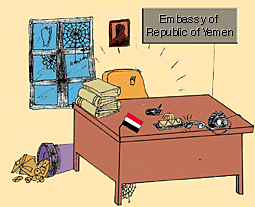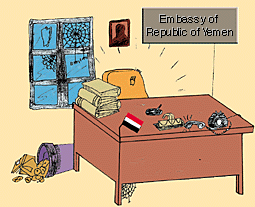
Our Diplomats Abroad: WHAT IS THEIR JOB? [Archives:1998/29/Last Page]
July 20 1998

In this article, I want to compare how actively the foreign embassies interact with us, and how dormant our embassies abroad are. Let me give 4 examples.
1. “Sorry, we are closed. The president is here!”
Last year, President Ali Abdullah Saleh paid a formal visit to the UK. One of the key objectives of the visit was to raise British business interest in Yemen.
In fact, many British firms were interested in considering possible business in Yemen. But when they called the embassy, apparently all the embassy people and part of the entourage of the president joined in his program.
In my mind, that is stupid. During the visit (and even before and after), the embassy should have been open for longer hours to respond to the needs of potential partners.
2. “Sorry, we don’t read Deutsche!”
Over the last few weeks, a friend translated to me some of the things written about Yemen in the German press. Some of it was inaccurate, and a little bit of it was just stupid.
Take two examples:
“There is no food to eat in Yemen!”
“30% of the Yemeni population is starving.”This, of course, is inaccurate. It would have taken one phone call from the embassy to these newspapers to show the error. There is no malice, it is just ill-informed journalism.
It is the duty of the embassy to follow what is written about Yemen and make sure it is accurate.
3. “Sorry, we work for the minister!”
A third misguided concept of the job of embassies is that they are at the service of senior government officials, especially the foreign minister. This is a typical Arab attitude which leads to voluntary self-enslavement for those in power.
Thus our embassies, do not care about Yemeni students in the countries of their posting. They do not care about businessmen who have work in those countries. They do not care about academic visitors who have research in those countries.
But as soon as some senior official comes to town, even on a private visit, they attend to the smallest needs he, his wife and children may have. It is disgusting.
4. “Sorry, we don’t mix with locals!”
There have been many times when I visit friends in various countries. How is it possible for a person who lives in Sanaa to have more friends among the people of another country than a Yemeni ambassador who has been there for years?
Okay, okay, forget about the ordinary people. But how is it possible for a person who lives in Sanaa to have more friends among the officials of another country than a Yemeni ambassador who has been there for years?
Now that is something.
5. “Sorry, I am busy with my private business.”
Many diplomats, especially the ambassadors carry out private commercial activities, on the side. Or is the official business an aside?
In some cases, the diplomats are even involved in illegal activities, such as smuggling of contraband goods, dealing in illegal currency conversion and other stuff. At the very least, they engage in agency representation, trade, investment transactions, etc. This behavior, protected by the immunity of diplomacy is illegal and immoral.
In short, most – not all – Yemeni diplomats do not serve our interests. Maybe we need to establish a training institute for our diplomats.
By: Abdulaziz Al-Saqqaf,
Yemen Times.
——
[archive-e:29-v:1998-y:1998-d:1998-07-20-p:./1998/iss29/lastpage.htm]


